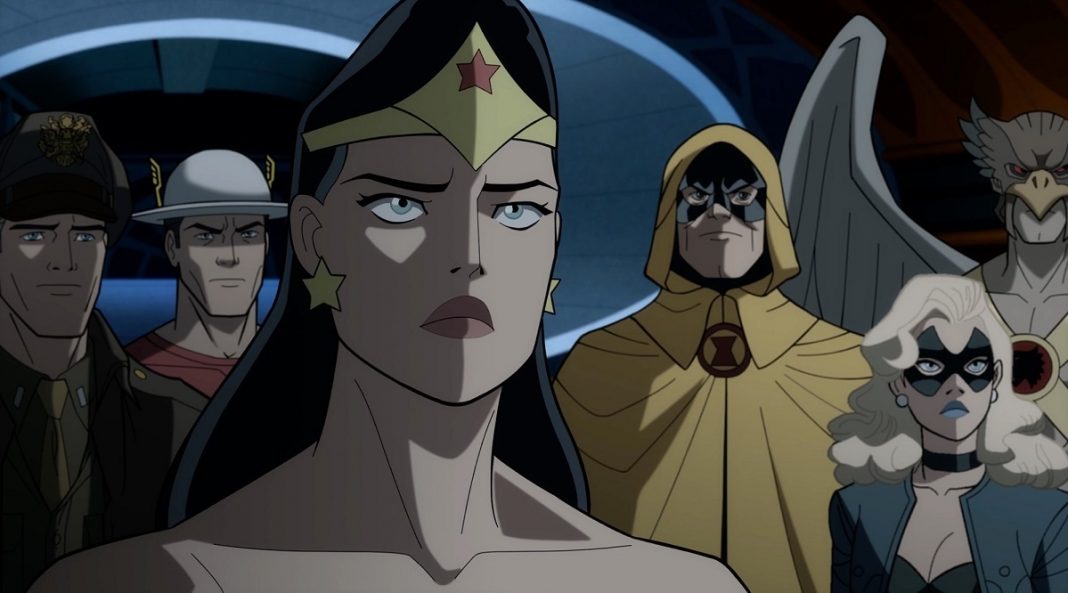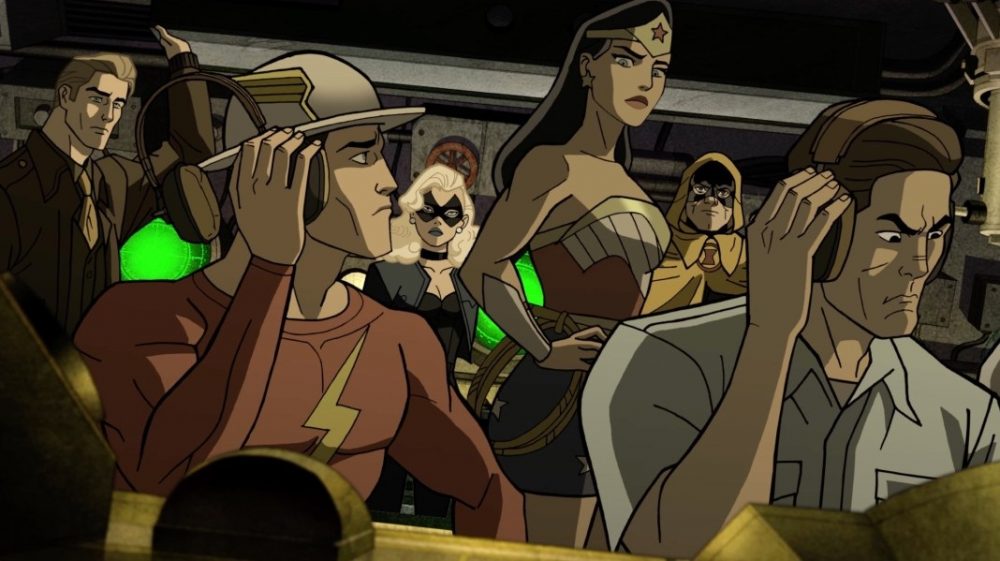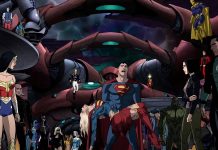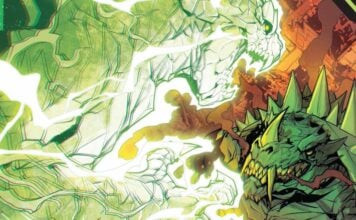In the wake of the New 52 relaunch, the Justice Society of America, the DC Comcis Golden Age superhero team from World War II, was essentially erased from the mainstream DC Comics Universe. Intended to foster new readership without convoluted continuity, the absence of the JSA has been difficult for longtime fans to ignore for the last decade. Thankfully, DC publishing has slowly but surely been correcting the course and the Justice Society has been restored to their rightful place in main DC Universe. It’s fitting then that the Golden Age superheroes are getting the spotlight in the latest DC animated direct-to-video film, Justice Society: World II that sees the modern-day Barry Allen/The Flash (voiced by Matt Bomer) thrust back in time to battle Nazis alongside the JSA including Wonder Woman (Stana Katic), Hourman (Matthew Mercer), Black Canary (Elysia Rotaru), Hawkman (Omid Abtahi), Steve Trevor (Chris Diamantopoulos), Aquaman (Liam McIntyre) as well as the OG Flash Jay Garick (Armen Taylor).
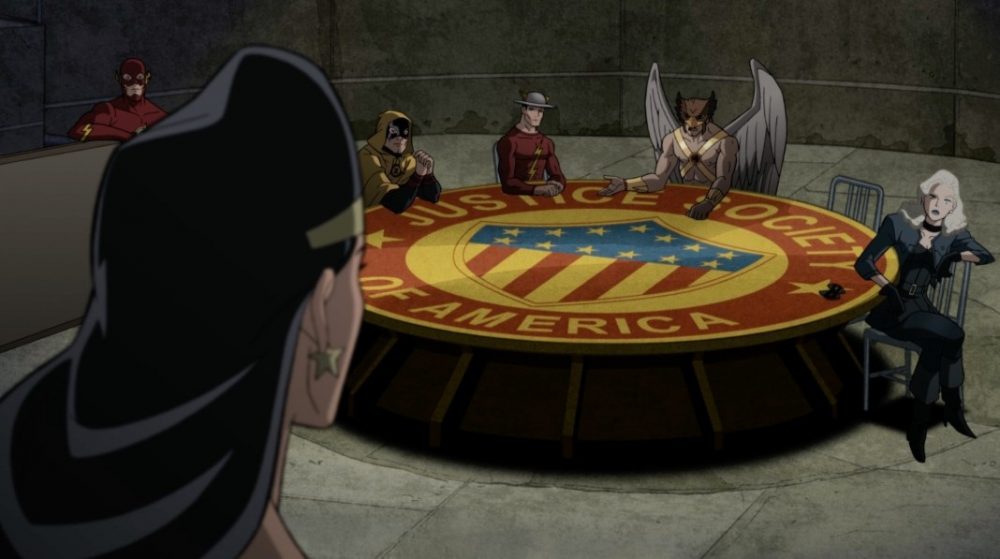
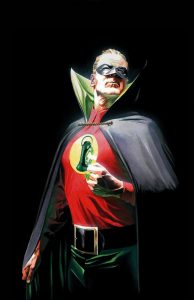
From the beginning, in picking the JSA roster for the film screenwriters Jeremy Adams and Meghan Fitzmartin knew that they couldn’t include every fan-favorite character. “Some people make a mistake thinking animation has an unlimited budget and you can use and do whatever you want but that’s not necessarily the case,” explained Adams. “We were doing the math of how many characters can we effectively service in an 87-minute story and how many of them can we give good solid moments and relationships. We wanted to keep it to characters that maybe make the story a little more difficult to get through. If we had Alan Scott [the Golden Age Green Lantern], you wouldn’t need a submarine to get to Atlantis. You could just make a construct. This adds a little more complication”
Wildcat/Ted Grant was another character Fitzmartin wanted to feature but knew couldn’t fit in the film. As she elaborated, “That was definitely one of the characters that I would’ve loved to have seen because of his relationship to Black Canary as her trainer. Ultimately it would have been a double beat to have him there as well. You do have to make the choices and sacrifices because of the power dynamics of the characters. But also we wanted to give everyone their story time. It’s very easy to feel like it’s too full and not connect with these characters.”
Joking that he wished he had all the money in the world to do a 4-hour long Snyder Cut for Justice Society: World War II, Adams would love to revisit the characters. “If this movie did really well I’d be happy [to do] another JSA in the Pacific with Atom-Smasher and some of the other characters. In my mind, you’ve got these characters running around and even in the original run of the JSA you’d have them split up from time to time in different missions.
Having room to properly delve into the interpersonal character relationships was definitely appreciated by director Jeff Wamester. His time directing television animation such as the Guardians of the Galaxy cartoon is vastly different than a direct-to-video DC animated movie. “The pace for TV is quite a bit faster and the stories are much more compact than something like this,” said Wamester. “I find it pretty fulfilling to do this kind of stuff because having a myriad of stories intertwine and overlap is exciting. The biggest difference is the pacing and the allowance to let stuff play out emotionally.”
When it came to recruiting the voice talent for the animated film, the process couldn’t have been smoother. In fact, since many of the actors had worked with voice director Wes Gleason on prior projects they were cast directly with no audition necessary. “Wes is smart enough to hire the right actors for the right roles,” testified Chris Diamantopoulos. “In this instance he knows that I have a huge affinity for ’30s and ’40s cinema. And I’ve always been looking for an opportunity to bridge a little Humphrey Bogart and a little Cary Grant into a character that I’m doing. So this was a real joy for me.”
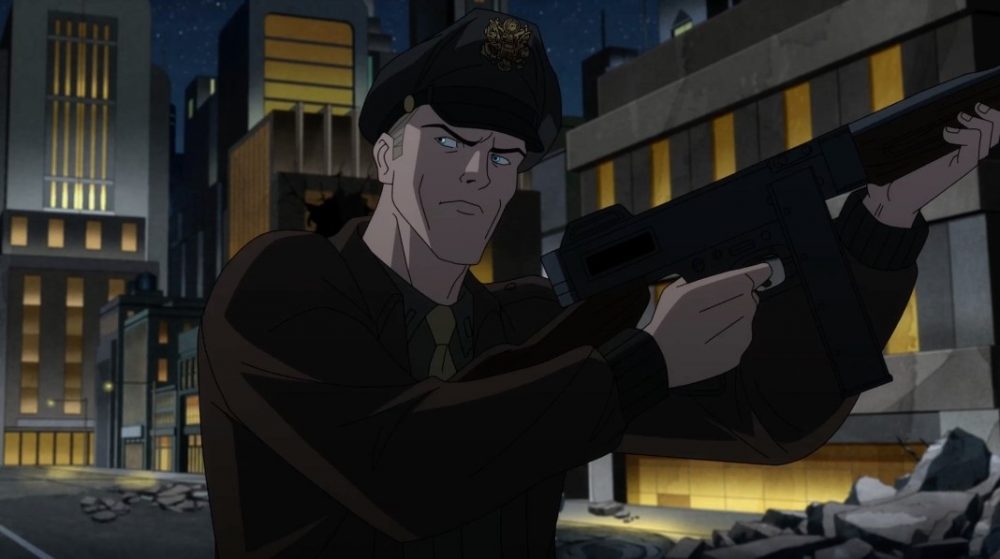
Unless you’re a dyed-in-the-wool fan, actors can easily find themselves lost researching these superhero roles by reading the original comic book source material. Matthew Mercer on the other hand didn’t require that much of a primer on Hourman. “I was familiar with the character in a cursory way. I knew of the more modern version of him than the classic Golden Age version. For this particular project, I did go back and research and read up on Rex Tyler and where this character was established and what makes him unique and stand out amongst these other iconic heroes of the time.”
In contrast, the admittedly contradictory and complicated backstory for Hawkman proved quite confusing for Omid Abtahi. “The more I learned about him the more I realized I didn’t know about him,” he confessed. “I was able to gather his backstory once I honed in on the Golden Age version. Of everything I learned and researched, the thing that stood out to me about Hawkman was that this is a man who has lived many a different life and he has access to those memories. So what I wanted to do was bring a thoughtful old soul type of interpretation to this character.”
Meanwhile, Rotaru delved as much as she could into Black Canary and then some. “I did as much as I could. I went to comics, animation, live-action. I went to history, WWII. I did a lot because it was such a heavy script that was so beautifully written and I didn’t want to ruin it. I almost did too much research on WWII which is just me being a weirdo. I really wanted to do it justice so I could be informed.”
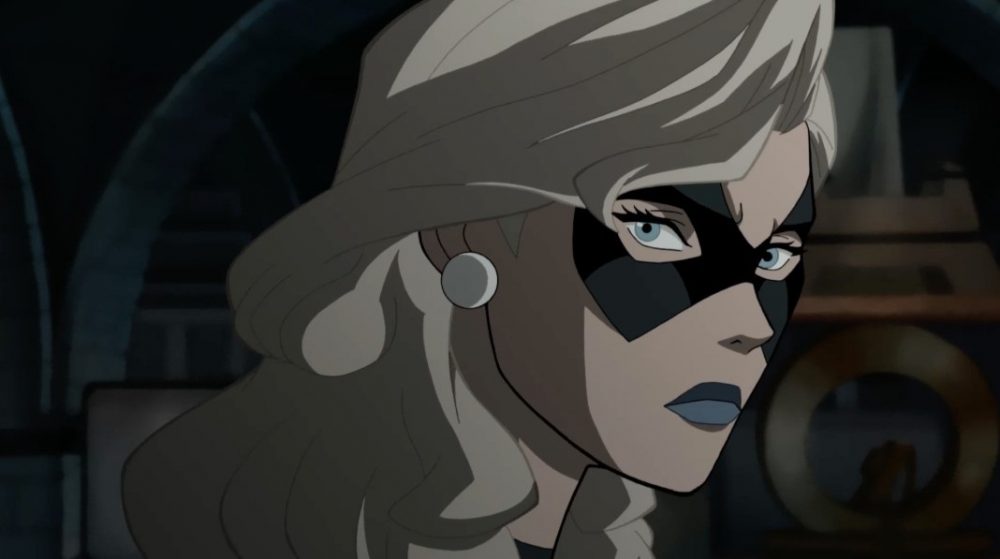
The King of Atlantis has come a long way since he first appeared 80 years ago in the pages of More Fun Comics #73. As viewers will discover when they watch Justice Society: World War II for themselves, Aquaman has a unique interpretation in the film (to say the least) that you won’t see in the mainstream comics. While he relied primarily on the script, Liam McIntyre still found diving into the comics very enlightening. “It’s important to be informed where he came from in the comics. Obviously in the comics they’ve reinvented him and readapted his stories multiple times from son of a lighthouse keeper to mystical super being born of Atlantis. Like in the comics where they reinterpret who he is and what that means, I thought it was important to take what was on the page at face value. Honor that rather than try to do something that didn’t make sense and bring in elements from his past iterations in a way that wasn’t appropriate.”
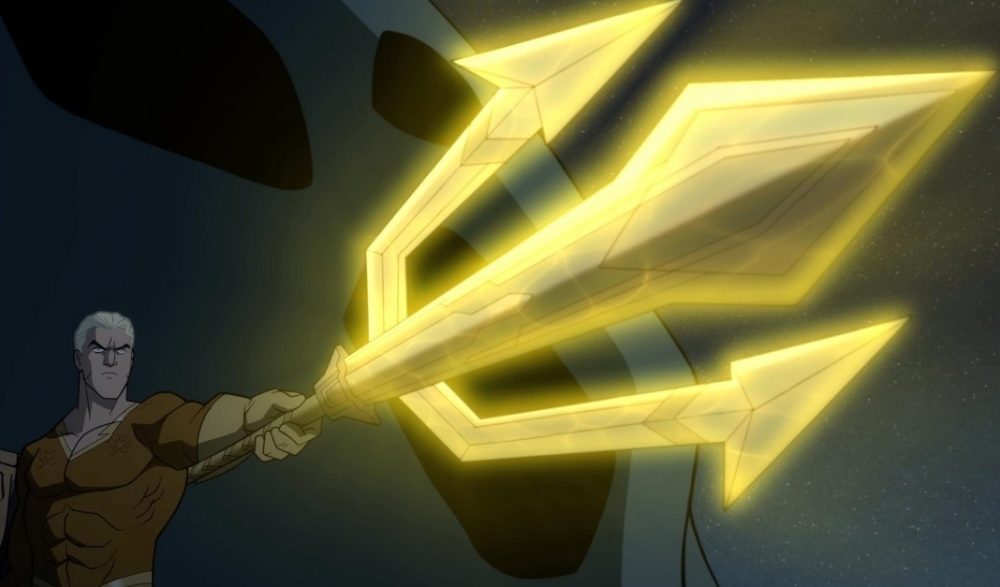
Bomer’s sentiments were echoed by Steve Trevor voice actor Chris Diamantopoulos. “I didn’t worry that I would fall into any Chris Pine-isms because we’re just not the same guy. So all I was able to do was appreciate his performance and recognize as I went through my performance if there were any similarities they were usually brought about by the era or script similarities.”
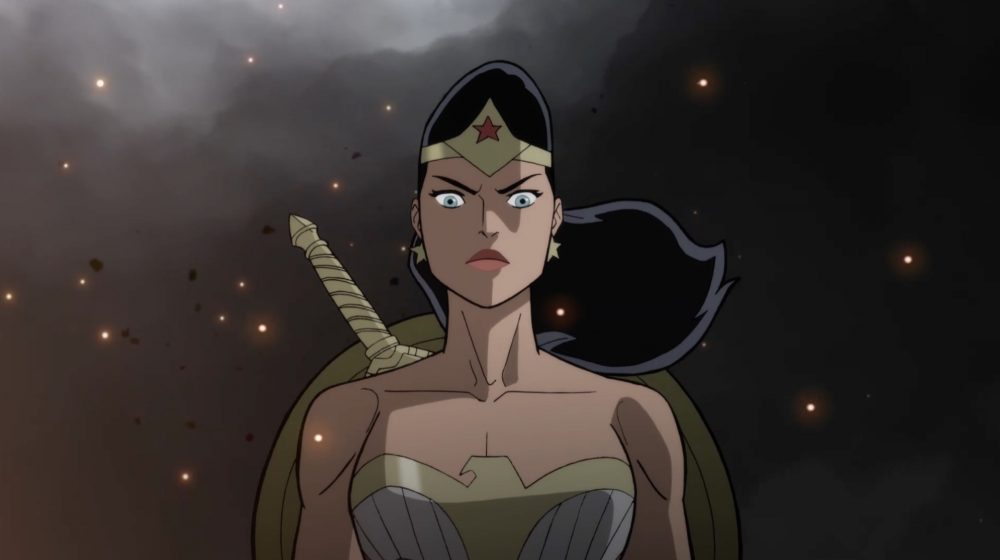
Discovering what makes their character tick is the challenge for every actor. Mercer was easily able to latch onto Hourman’s humanity. “Aside from this hour of time [of power] and the inherent addictive dangers of him embracing this hour, he is as vulnerable as anybody that the JSA is trying to save. He very much could be considered a civilian costume at that point. For him, it’s dealing with the internal struggle of, ‘I understand my limits. I understand my mortality. And I want to contribute as much to this team as all of my compatriots around me. Is it unfair or dangerous to put myself in the line of fire?’ For me it was very much that human need to embrace courage.”
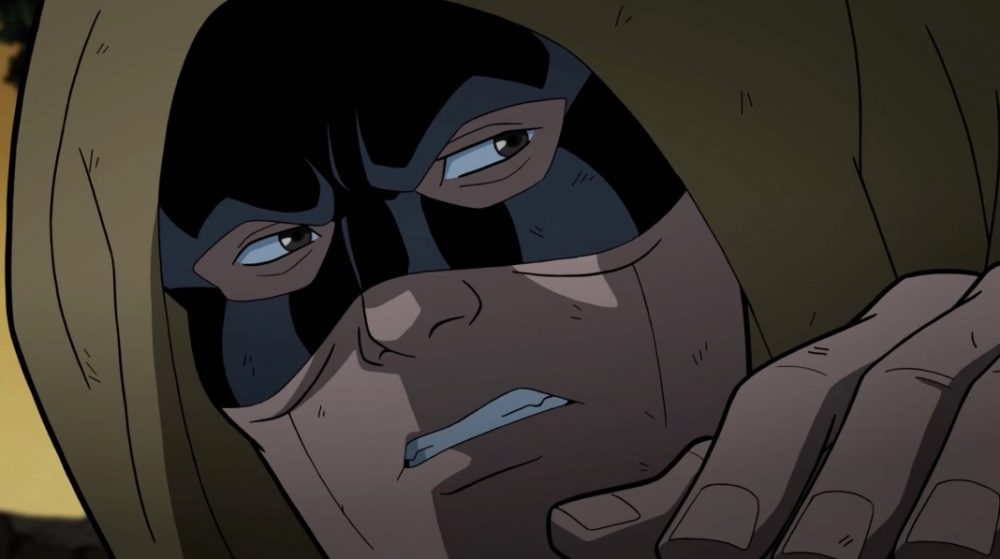
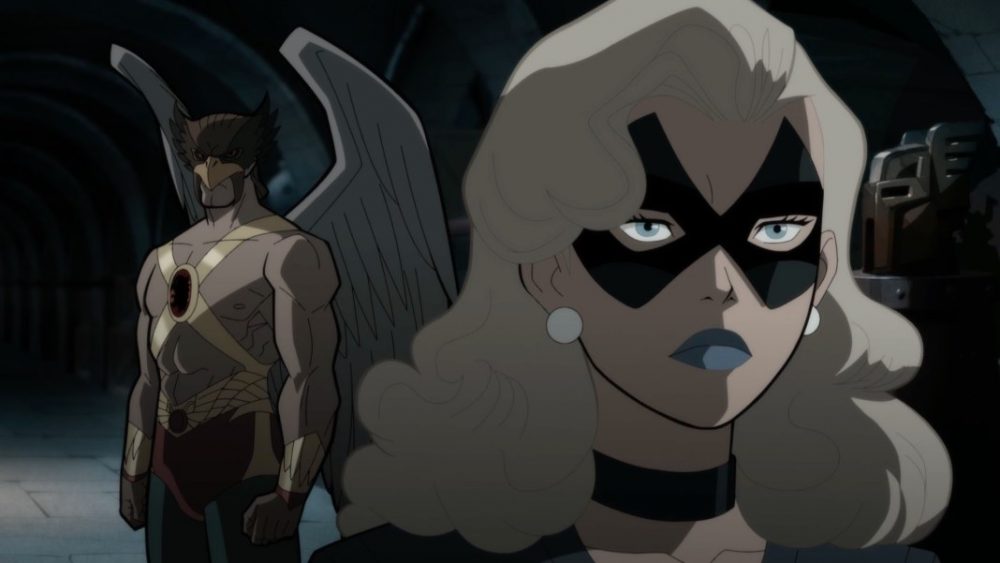
In his discussions about Jay with Gleason, Armen Taylor recalled being told, “‘You’re a little more pragmatic and grounded in how you see the world. But you’re also a really big nerd on how you see the Speed Force. You’ve never really been able to talk to anyone about it and every time you do their eyes glaze over. So to have Barry show up and get to talk to him about this thing you both share, there’s sort of an excitement.’”
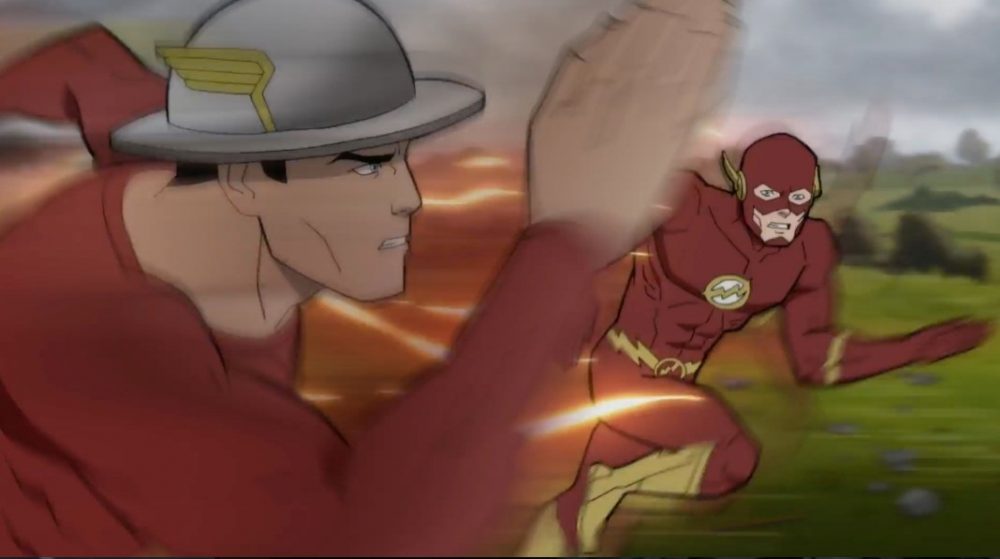
The inherent leadership qualities of Aquaman and Wonder Woman were something their respective voice actors had to tap into. As McIntyre explained his process for Aquaman, “I’ve always found in my different characters to bring an element of fantasy to it. I’ve found that I could connect best to a character when I find a piece of myself that can relate to what they’re going through.”
Katic shared similar sentiments about Wonder Woman but felt her approach as a leader sets the Amazon apart. “When you talk about balancing the warrior part of this character with the more compassionate and artful side, that comes through in her relationships with the other team members. It comes through in her relationship in particular with Steve Trevor,” she said. “You’re talking about a character that is a non predatory leader, a person who has a tremendous amount of integrity and heart.”
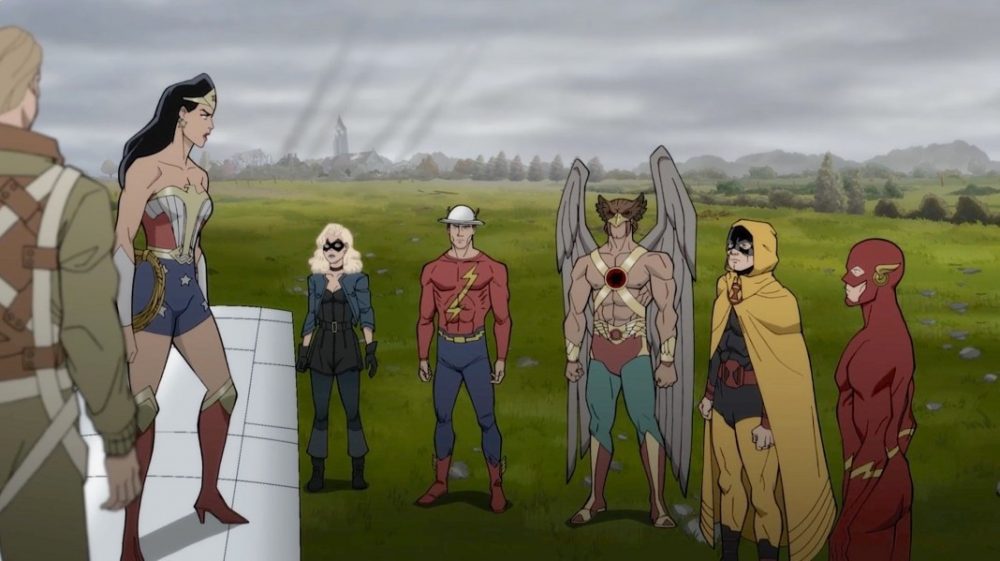
Incidentally, before she began working on the script writer Meghan Fitzmartin took advantage of a pre-planned trip to London to gain new insights and perspective. “It was really helpful because in America we have a different viewpoint on World War II. It makes sense since we weren’t on the same ground. Walking around London and seeing how there are still bullet holes in walls and buildings bombed out that haven’t been torn down. There’s still so much evidence of this war that’s so prevalent. It was interesting to live in the same space of people who this is part of their history, identity, and culture that we in America don’t have those physical scarrings.”
Producer Butch Lukic, who lived in England in his youth, agreed with Fitzmartin’s observation and brought his own experiences to the film. “Growing up as a kid in the ’70s there, everything was still geared towards WWII. There were plenty of TV productions that were all based on WWII. It was always in my mind,” said Lukic. “My dad was in WWII. My mom was a kid during WWII when my uncles were fighting. It was part of our culture. Here, I get it because America wasn’t directly hit by the war on land. They didn’t have to defend their land. But plenty of Americans had to go over there and do the jobs. If it wasn’t for Americans honestly I don’t think we would have survived the war.”
After living through the COVID-19 pandemic in the past year however, it’s safe to say Americans have a greater understanding of what people went through during WWII. The resonance of Justice Society: World War II with viewers right now wasn’t lost on any of the filmmakers. “It reminds me of being a kid in the ’80s, the idea of nuclear hanging over you. I think we’ve had quite a bit of time where we’ve had quite a bit of peace and stability in the world,” said Wamester. “This thing is a reminder that we’re not always going to have that. Having a movie like this it’s nice to have the idea that they made it through then and we’ll make it through now is a great story to have. We just have keep moving forward.”
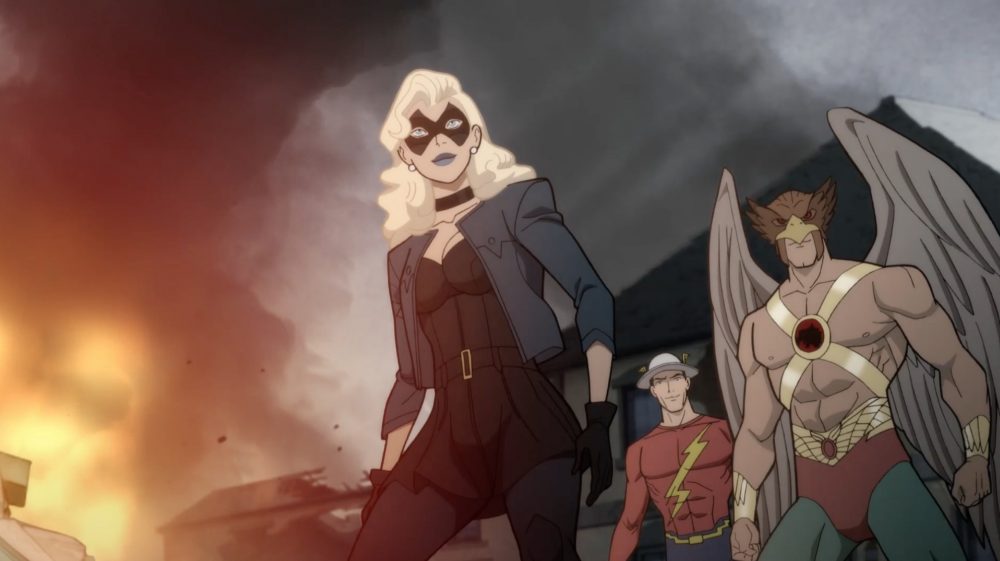
Despite the hardships encountered in the last year, the pandemic has allowed us to reexamine our lives. “One of the things I noticed for me that became much more relevant to me over the course of the pandemic was the journey that Barry goes through in this,” revealed Bomer. “I‘ve been able to really be present with my family and value those relationships in a way that you don’t always when you’re working a lot. I think that’s one of the aspects that’s hit home in the past year.”
Rotaru shared similar feelings, “You really start to bond or get close to your core people. For me personally it was seeing the JSA crew and them going through their own story and hurdles but still keeping it together as a unit and supporting each other that was in my own friendship and life.”
“The whole movie for me is about the importance of community and pushing forward and being together during some of the hardest moments and not letting them get to you,” said Fitzmartin.
Jeremy Adams echoed the same thoughts as his co-writer, “There’s something really great about the fact that you have this cast of characters that are totally different. They’re working for a common cause. When we as a society can work together, collaborate, and meet each other in the middle I think we can do great things.”
“There is a continuous sense socially that as the individual you are powerless,” said Matthew Mercer. “That things that are larger than you in this world cannot be aided or contributed towards as just one lonely person. If you truly believe in something and want to see change for better in the world, do not diminish yourself by thinking you cannot contribute as well as other people.”
Nevertheless this era can still inspire us today. As Armen Taylor put it, “As a group the nation pulled itself together and went, ‘I will go without so to make sure that we can survive and win this thing we’re facing.’ Nowadays with masking and social distancing and taking precautions maybe seem a little restrictive to certain people. Do your part to make it better for the person you don’t even know. I think this movie brings that era back in a beautiful way.”
“Beyond the socio-political things it’s a well told story where the heroes win. You have a team of people that take on any problem and offer any sacrifice to try and make the world a better place,” said Liam McIntyre. “I just have a lot of fondness for that right now because it’s been a rough year. You just want to believe that you can see in yourself something like that to push further and harder.”
“This is a story about characters that are fighting evil with integrity. I think we’re craving leaders who have integrity and are fighting for what’s right for justice. They’re fighting for the value of human life. In a way this kind of a story is a bit of comfort food after everything we’ve gone through,” said Stana Katic.
I think perhaps Chris Diamantopoulos expressed it most eloquently, “Whether you’re superheroic or not, when the world is in peril everybody suffers. There’s no greater understanding for us as a society than looking at WWII. Looking at where we almost landed and how heroes and giants got us through. And those heroes and giants weren’t Superman and Batman. They were the men and women who bravely fought and said no to tyranny. Where we are now in regards to the pandemic and social injustice, it’s the same thing. You don’t need superpowers to sharpen your moral compass and do the right thing. In regards to the pandemic, you don’t need superpowers to get out of this. You need to stay kind, be with each other, and recognize that we can get through this if we do the right thing.”
Justice Society: World War II is available now on Digital and arrives on 4K Ultra HD Combo Pack and Blu-ray Combo Pack on May 11, 2021.

